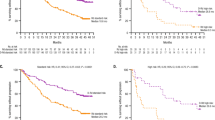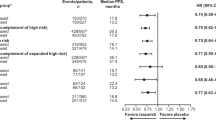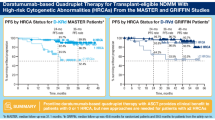Abstract
This retrospective analysis investigated the prognostic value of del(13) and t(4;14) abnormalities and the impact of prior treatment on outcomes in 207 heavily pretreated patients with relapsed or refractory multiple myeloma (MM) treated with lenalidomide plus dexamethasone. Patients with relapsed or refractory MM who had either earlier received thalidomide or bortezomib, or for whom continuation of these agents was contraindicated, and who had fluorescence in situ hybridization data available were included in the analysis. Patients with relapsed or refractory MM who received treatment with lenalidomide plus dexamethasone in the presence of del(13) and t(4;14) chromosomal abnormalities had lower overall response rates (ORRs) and shorter median progression-free survival (PFS) and overall survival (OS) compared with those who did not have these abnormalities. The results also showed that prior treatment with bortezomib was associated with shorter median PFS and OS. Progression during thalidomide therapy was the only significant independent predictor for OS and that the presence of del(13) and hemoglobin levels <10 g per 100 ml were prognostic factors for ORR and PFS, but not OS, in these heavily pretreated relapsed or refractory MM patients treated with lenalidomide plus dexamethasone.
This is a preview of subscription content, access via your institution
Access options
Subscribe to this journal
Receive 12 print issues and online access
$259.00 per year
only $21.58 per issue
Buy this article
- Purchase on Springer Link
- Instant access to full article PDF
Prices may be subject to local taxes which are calculated during checkout


Similar content being viewed by others
References
Jemal A, Siegel R, Ward E, Hao Y, Xu J, Murray T et al. Cancer statistics, 2008. CA Cancer J Clin 2008; 58: 71–96.
Sirohi B, Powles R . Epidemiology and outcomes research for MGUS, myeloma and amyloidosis. Eur J Cancer 2006; 42: 1671–1683.
Dimopoulos M, Spencer A, Attal M, Prince HM, Harousseau JL, Dmoszynska A et al. Multiple Myeloma (010) Study Investigators. Lenalidomide plus dexamethasone for relapsed or refractory multiple myeloma. N Engl J Med 2007; 357: 2123–2132.
Weber DM, Chen C, Niesvizky R, Wang M, Belch A, Stadtmauer EA et al. Multiple Myeloma (009) Study Investigators. Lenalidomide plus dexamethasone for relapsed multiple myeloma in North America. N Engl J Med 2007; 357: 2133–2142.
Fonseca R, Blood E, Rue M, Harrington D, Oken MM, Kyle RA et al. Clinical and biological implications of recurrent genomic aberrations in myeloma. Blood 2003; 101: 4569–4575.
Avet-Loiseau H, Attal M, Moreau P, Charbonnel C, Garban F, Hulin C et al. Genetic abnormalities and survival in multiple myeloma: the experience of the Intergroupe Francophone du Myélome. Blood 2007; 109: 3489–3495.
Gertz MA, Lacy MQ, Dispenzieri A, Greipp PR, Litzow MR, Henderson KJ et al. Clinical implications of t(11;14)(q13;q32), t(4;14)(p16.3;q32), and -17p13 in myeloma patients treated with high-dose therapy. Blood 2005; 106: 2837–2840.
Debes-Marun CS, Dewald GW, Bryant S, Picken E, Santana-Davila R, Gonzalez-Paz N et al. Chromosome abnormalities clustering and its implications for pathogenesis and prognosis in myeloma. Leukemia 2003; 17: 427–436.
Zonder JA, Crowley JJ, Bolejack V, Hussein MA, Moore DF, Whittenberger BF et al. A randomized Southwest Oncology Group study comparing dexamethasone (D) to lenalidomide + dexamethasone (LD) as treatment of newly-diagnosed multiple myeloma (NDMM): impact of cytogenetic abnormalities on efficacy of LD, and updated overall study results. J Clin Oncol 2008; 26. [Abstract 8521].
Reece D, Song KW, Fu T, Roland B, Chang H, Horsman DE et al. Influence of cytogenetics in patients with relapsed or refractory multiple myeloma treated with lenalidomide plus dexamethasone: adverse effect of deletion 17p13. Blood 2009; 114: 522–525.
Kapoor P, Kumar S, Fonseca R, Lacy MQ, Witzig TE, Hayman SR et al. Impact of risk stratification on outcome among patients with multiple myeloma receiving initial therapy with lenalidomide and dexamethasone. Blood 2009; 114: 518–521.
Bladé J, Samson D, Reece D, Apperley J, Björkstrand B, Gahrton G et al. Criteria for evaluating disease response and progression in patients with multiple myeloma treated by high-dose therapy and haemopoietic stem cell transplantation. Myeloma Subcommittee of the EBMT. European Group for Blood and Marrow Transplant. Br J Haematol 1998; 102: 1115–1123.
Stadtmauer EA, Weber DM, Niesvizky R, Belch A, Prince MH, San Miguel JF et al. Lenalidomide in combination with dexamethasone at first relapse in comparison with its use as later salvage therapy in relapsed or refractory multiple myeloma. Eur J Haematol 2009; 82: 426–432.
Wang M, Dimopoulos MA, Chen C, Cibeira MT, Attal M, Spencer A et al. Lenalidomide plus dexamethasone is more effective than dexamethasone alone in patients with relapsed or refractory multiple myeloma regardless of prior thalidomide exposure. Blood 2008; 112: 4445–4451.
Naujokat C, Fuchs D, Berges C . Adaptive modification and flexibility of the proteasome system in response to proteasome inhibition. Biochim Biophys Acta 2007; 1773: 1389–1397.
Fuchs D, Berges C, Opelz G, Daniel V, Naujokat C . Increased expression and altered subunit composition of proteasomes induced by continuous proteasome inhibition establish apoptosis resistance and hyperproliferation of Burkitt lymphoma cells. J Cell Biochem 2008; 103: 270–283.
Sagaster V, Ludwig H, Kaufmann H, Odelga V, Zojer N, Ackermann J et al. Bortezomib in relapsed multiple myeloma: response rates and duration of response are independent of a chromosome 13q-deletion. Leukemia 2007; 21: 164–168.
Jagannath S, Richardson PG, Sonneveld P, Schuster MW, Irwin D, Stadtmauer EA et al. Bortezomib appears to overcome the poor prognosis conferred by chromosome 13 deletion in phase 2 and 3 trials. Leukemia 2007; 21: 151–157.
Author information
Authors and Affiliations
Consortia
Corresponding author
Rights and permissions
About this article
Cite this article
Avet-Loiseau, H., Soulier, J., Fermand, JP. et al. Impact of high-risk cytogenetics and prior therapy on outcomes in patients with advanced relapsed or refractory multiple myeloma treated with lenalidomide plus dexaméthasone. Leukemia 24, 623–628 (2010). https://doi.org/10.1038/leu.2009.273
Received:
Revised:
Accepted:
Published:
Issue Date:
DOI: https://doi.org/10.1038/leu.2009.273
Keywords
This article is cited by
-
Clinical Features and Outcomes of Patients with Double-Hit/Triple-Hit Multiple Myeloma Detected at Relapse
Indian Journal of Hematology and Blood Transfusion (2023)
-
Microparticles and PD1 interplay added a prognostic impact in treatment outcomes of patients with multiple myeloma
Scientific Reports (2021)
-
Phase I/II study of bortezomib, lenalidomide, and dexamethasone treatment for relapsed and refractory multiple myeloma
International Journal of Hematology (2020)
-
Conventional Cytogenetics and Interphase Fluorescence In Situ Hybridization Results in Multiple Myeloma: A Turkey Laboratory Analysis of 381 Cases
Indian Journal of Hematology and Blood Transfusion (2020)
-
Expert Panel Consensus Statement for Proper Evaluation of First Relapse in Multiple Myeloma
Current Hematologic Malignancy Reports (2019)



